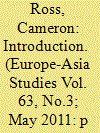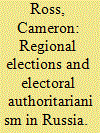|
|
|
Sort Order |
|
|
|
Items / Page
|
|
|
|
|
|
|
| Srl | Item |
| 1 |
ID:
182060


|
|
|
|
|
| Summary/Abstract |
As the national security apparatus continues to shift toward great-power competition, there is still a significant lack of understanding about the nature of the
current competition and how the armed forces can engage within the strategic
reality. This article outlines the road to competition with China, as well as the
nature of the struggle, to provide clarity on the challenge such competition poses.
Within that context, this article provides recommendations for how the military
can translate the strategic concepts found within the National Defense Strategy
into more tangible actions.
|
|
|
|
|
|
|
|
|
|
|
|
|
|
|
|
| 2 |
ID:
104175


|
|
|
|
|
| Publication |
2011.
|
| Summary/Abstract |
1The Russian Federation currently comprises 83 federal subjects (originally 89). These are divided into six sub-categories, three of which are based on different levels of ethnic autonomy (republics, autonomous okruga and one autonomous oblast') and three purely administrative categories (krai, oblasti and cities of federal importance). In this volume these entities will be referred to collectively as 'regions'.Putin became Russia's prime minister in August 1999, just one week after Chechnya-based militants invaded Dagestan, and his administrative style was cast in the opening months of the ensuing war. Second, shortly after his presidential inauguration in May 2000, Putin announced the reorganisation of the Russian Federation on the model of Russia's seven military districts. Third, on 13 September 2004-barely one week after the Beslan hostage crisis, and in explicit response to 'terrorist' threats-Putin announced the centralised appointment of Russia's regional governors, and an overhaul of the Russian electoral system that promised additional strength for the party of power. Fourth, in January 2010, President Dmitry Medvedev announced the formation of the North Caucasus Federal District with a focus upon the endemic problems of the region.
|
|
|
|
|
|
|
|
|
|
|
|
|
|
|
|
| 3 |
ID:
144190


|
|
|
|
|
| Summary/Abstract |
The institutionalisation and nationalisation of Russia’s party system, which is dominated by United Russia (Edinaya Rossiya—UR), has played a major role in the building of Putin’s ‘power vertical’. Nevertheless, despite the fact that formal relations within UR are highly centralised, informal practices allow for far greater degrees of regional autonomy. Focusing on UR’s candidate selection for the 2011 Duma election this article provides an examination of cross-regional variations in the relations between UR’s Party Centre and its regional branches. As electoral legislation requires the segmentation of party lists into ‘regional groups’, the composition of the regional lists, specifically the share of ‘native candidates’, is considered as an indicator of the level of autonomy of regional branches. Ordinal regression analysis confirms our main theoretical hypotheses. In the more financially autonomous regions, UR’s regional branches will have more leverage and bargaining power in their relations with the Party Centre. A second important factor is heterogeneity: the more a region’s socio-economic indices deviate from the national average (either up or down), the less its UR branch is subordinate to the Party Centre.
|
|
|
|
|
|
|
|
|
|
|
|
|
|
|
|
| 4 |
ID:
136931


|
|
|
|
|
| Summary/Abstract |
In December 2011, ‘a volcano of social activism that had long been dormant started to erupt in Russia’ (Petrov 2012). A tidal wave of mass protest movements swept through the capital and then engulfed scores of Russia's regions. These demonstrations came as a great shock to the Russian leadership. After decades of the passive acceptance of the status quo it appeared that civil society was at last wakening up, and that it was members of a rising middle class which were at the forefront of the protests against the regime. As Aron observed, ‘No longer burdened with providing for the basic needs of their families and now enjoying perhaps unprecedented, for Russia, personal freedoms and prosperity, the middle class's more socially active members appear to believe they are entitled to become stakeholders in a functioning, fair, and less corrupt state’ (Aron 2012, p. 4).
|
|
|
|
|
|
|
|
|
|
|
|
|
|
|
|
| 5 |
ID:
105272


|
|
|
| 6 |
ID:
104188


|
|
|
|
|
| Publication |
2011.
|
| Summary/Abstract |
IN THIS ESSAY I EXAMINE THE PROBLEMS OF institutionalising and nationalising
parties in Russia's regions and I trace the development of the party system from
the period of fragmentation and high levels of volatility under Yel'tsin, to the
monopolisation of power under Putin and Medvedev. In particular, I examine the
party saturation and non-saturation of regional assemblies.
|
|
|
|
|
|
|
|
|
|
|
|
|
|
|
|
| 7 |
ID:
060555


|
|
|
|
|
| Publication |
Manchester, Manchester University Press, 2004.
|
| Description |
xii, 292p.
|
| Standard Number |
0719068002
|
|
|
|
|
|
|
|
|
|
|
|
Copies: C:1/I:0,R:0,Q:0
Circulation
| Accession# | Call# | Current Location | Status | Policy | Location |
| 049488 | 320.947/ROS 049488 | Main | On Shelf | General | |
|
|
|
|
| 8 |
ID:
136925


|
|
|
|
|
| Summary/Abstract |
The wave of protests that shook the Russian capital and scores of Russian cities over the period 2011 to 2013 came as a great shock to the political establishment in the Kremlin. After decades of the passive acceptance of the status quo it appeared that civil society was at last wakening up. As Jensen notes, ‘after years of apathy, a new social force—the Russian middle class—seemed to be emerging, with a message that included not only a political, but also a moral and emotional rejection of the corrupt authoritarian state that developed during the Putin era’ (Jensen 2013, p. 1). However, by July 2013 the steam seemed to have run out of the protest movement. As Treisman notes, ‘Whether one uses police figures (almost certainly too low) or those of the opposition (probably too high), the number demonstrating in Moscow each month [fell] sharply—from 210,000 in December 2011 to 5,500 in July 2013 (according to opposition reports), or 57,500 to 2,000 (according to the authorities)’ (Treisman 2013, p. 256). This collection examines these momentous developments which shook the political establishment over the period 2011 to 2013 in the Kremlin and it charts the rise and decline of the non-systemic opposition in Russia at both the national and regional levels.
|
|
|
|
|
|
|
|
|
|
|
|
|
|
|
|
| 9 |
ID:
120684


|
|
|
|
|
| Publication |
2013.
|
| Summary/Abstract |
This study examines the support for United Russia in 43 regional assembly elections which were conducted over the period from March 2008 to March 2011. In contrast to previous studies, which have tended to focus on the overall results of regional elections or just on the party-list votes, it provides a quantitative analysis of the votes for United Russia in the plural single member district contests. By widening the traditional focus on the aggregate results and party-list voting the study brings to light important variations in the patterns of United Russia's electoral domination of regional assemblies. The specific form of United Russia's domination depends on the configuration of regional elites and their strategies. Social and economic features of the regions have little impact on the degree and modes of United Russia's electoral domination, but influence the ability of regional leaders to ensure electoral mobilisation in the regions and this is more significant the higher the level of the election.
|
|
|
|
|
|
|
|
|
|
|
|
|
|
|
|
| 10 |
ID:
164515


|
|
|
|
|
| Summary/Abstract |
Grounded in the main theoretical approaches to the study of electoral volatility, this article examines cross-regional variations in the levels of volatility for United Russia (UR) in Duma elections over the period 2003–2016, which are juxtaposed with the level of volatility for the Kremlin’s candidates in presidential elections. The main finding is that ‘regime type’ or, more precisely, ‘authoritarianism’ is the key explanatory variable. Stronger authoritarian rulers are able to control regional elites and ensure the best results for UR by exerting administrative pressure on voters. This reduces the level of volatility in support for UR. At the same time, economic and institutional explanations have a partial significance. Here, Duma elections differ from presidential elections, which demonstrate a much lower degree of volatility; in addition, economic factors appear insignificant.
|
|
|
|
|
|
|
|
|
|
|
|
|
|
|
|
|
|
|
|
|